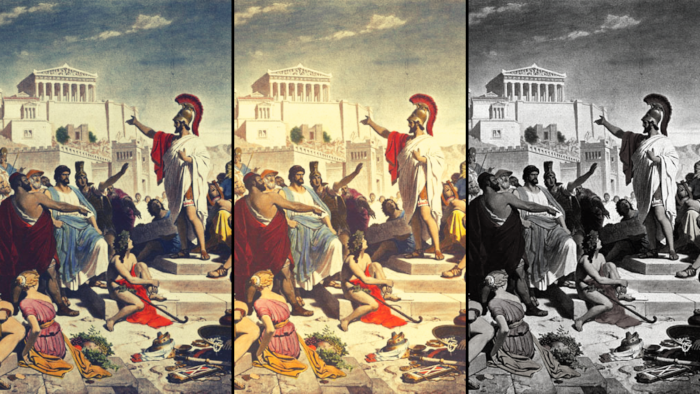A (Very) Brief History and Reclaiming Populism From Its Roots

The term populism is said to be traced back to the 19th century, though its roots extend all the way to the Age of Pericles, making it one of the oldest and most misunderstood political concepts today. Over the years, populism has been described as a mood, an ideology, an approach, a strategy, and even a feeling. It’s been associated with the Tea Party movement in the United States, the global Occupy movement, the People’s Party of Canada, and the Indignados movement in Spain. It’s been linked to political leaders of all stripes, from Hugo Chávez to Donald Trump. The term seems to be both meaningless and all-encompassing. It can mean all things to all people, muddying the political landscape. It is through these various iterations and phases that the term now raises more questions than answers – but its meaning is actually more clearly defined than what is portrayed by hegemonic institutions.
From Athenian Democracy to the People’s Party in the US
For a long time, populism went hand in hand with democracy. It was once viewed as a legitimate approach that protected workers interests, reduced economic inequality, and combatted the interests of the few.
Despite what some may believe today, the origins of populism can be traced back thousands of years to the first ever known democratic system in the world: Athenian democracy. In this system, decision-making powers resided in the Assembly, the sovereign governing body of Athens. The Assembly was controlled by The People (‘The People’ at this time comprised of male citizens over the age of eighteen), making it the first ever populist movement in practice. Assembly meetings were held 40 times a year, and were open to The People to participate. At the meetings, decisions about Athenian life were made by a simple majority vote. While this system only lasted a couple hundred years, its relevance continues to this day.
In the 1860s, populism became associated with the Russian Narodniks, a politically conscious movement whose main goals were to fight tsarism and support the equal distribution of land and the right to self-govern. A couple decades later, populism emerged in the United States, with the establishment of the People’s Party in 1891. The People’s Party was an egalitarian, agrarian party that sought to get rid of the gold standard, reject capitalist exploitation, nationalize the railroads, and snuff out political corruption. For many reasons, the Party underwent internal squabbles and ultimately dissolved. Populism also emerged in other regions, most notably in Latin America, where it became a popular political tradition. Well-known populist leaders in the region include Juan Perón in Argentina (1946-55), Evo Morales in Bolivia (2006-2019), and Hugo Chávez in Venezuela (2002-2013).
The Smear Campaign Begins
For a long time, populism went hand in hand with democracy. It was once viewed as a legitimate approach that protected workers interests, reduced economic inequality, and combatted the interests of the few.
It wasn’t until the 1950s when populism’s reputation became unfairly tarnished, thanks in large part to influential public intellectuals who viewed populism as incompatible with democracy. One of the notable intellectuals of this time was Richard Hofstadter, an American historian who continues to wield immense authority today. Hofstadter’s book, The Age of Reform (1955), has been regarded as ‘the most influential book ever published on the history of 20th century America.’ The book analyzes populism through the lens of progressive movements, though it wildly misses the mark and serves instead to present a revisionist picture of populism, and undercuts populism’s contribution to democracy throughout history.
Hofstadter and his insular group of academic friends popularized ill sentiments about populists, framing them as ignorant, reactionary anti-intellectuals. Unsurprisingly, to Hofstadter, who belonged to the elite, populism was the enemy, and it was often used to explain anything bad that has ever happened in history: Hitler, McCarthy, lynch mobs, etc. Being an elitist of the highest order, Hofstadter wanted to preserve his status as a technocratic intellectual. He saw agitators, dissidents, and other status quo disruptors as great inconveniences and personal threats to his goals.
So far, Hofstadter has been successful in undermining the populist movement and crushing the influence of the masses. The book continues to attract widespread attention, both from admirers and critics alike.
Since Hofstadter’s book was released, these misconceptions persisted – and continue to this day. Cas Mudde is another contemporary academic who employs the same ill treatment of populism. Mudde sees populists as ‘dividers, not uniters’ who believe in a ‘thin-centered ideology.’ Mudde, like other academics, reduces populism to a vague series of shapes and lines, presenting populism as a caricature of its former self.
Around the same time that Hofstadter and other intellectuals condemned populism, paranoia about communism erupted into mass hysteria. Populism, like communism, became a dirty word. And much like communism, it had to be quashed at all costs – including its advocates.
In the early 1950s, US Senator Joseph McCarthy led a brutal campaign to quash labor and civil rights movements under the guise of fighting communism. His loyal followers, the McCarthyites, feverishly blacklisted thousands of activists, writers, artists, and actors who loosely supported broad campaigns for peace and economic justice. Universities, public schools, government agencies, and radio and television networks purged anyone who was deemed to be sympathetic to communism. Between the period of 1949 and 1954, hundreds of investigations were conducted in which community organizers, entertainers, and trade unionists were interrogated about their personal lives, activities, and political views. By the late 1950s, it is estimated that roughly one out of five US workers had been required to undergo a ‘loyalty review’. If workers failed the review, they were fired, their reputations tarnished, and some were imprisoned. Celebrities were not immune to the purge, either. At that time, Charlie Chaplin was denied re-entry to the United States. W.E.B. Du Bois was denied the US passport that would have allowed him to return to the country of his birth. Du Bois lived out his last days in Ghana.
A 1955 Canadair ad perfectly embodied this period of mass hysteria and fear. The ad read: “Everywhere are evidences of the continuous underground, cancerous movements of Communism … Only eternal vigilance can protect us against Communism and its infiltration into our way of life.”
Only today, the threat isn’t communism – it’s populism.
“The Cancer of Populism is Devouring the West”
The threat of populism has been magnified to the point of hysteria – and the media has been all too happy to stoke more confusion and fear by pushing out articles like this: “Why Populism Is Rising And How To Combat It,” this: “The cancer of populism is devouring the West,” and this: “Elect a populist, people die.” To the media, populism is an ‘infection’ that must be treated.
Other organizations have jumped on the smear campaign, too. A number of self-described independent organizations have been feverishly publishing reports and creating toolkits to combat the pervasive threat of populism.
The Center for a New American Security (CNAS), a US-based independent organization that develops national security and defense policies published a toolkit ‘Combating Populism,’ with the goal of dismantling the “threat” of populism and populist leaders who attempt to weaken democracy. From the outset, the toolkit mischaracterizes populism and removes it from its democratic roots. In the toolkit, the authors suggest neutralizing populists through a series of political manipulation and politicking. The toolkit reads more like a PR strategy for political leaders to appear to be relatable to those poor, uneducated, rural workers who don’t know what’s best for them. To preserve democracy, the toolkit suggests that we allow ‘far-right’ populist parties to compete in the political system, but that we should control certain ‘illiberal’ ideas these parties promote. It remains unclear what they deem might be ‘illiberal’ but apparently this method of arbitrarily controlling what policies political parties can or cannot promote is their way of preserving democracy. Ironically, by controlling what policies parties can or cannot promote ends up undermining, not preserving democracy.
CNAS isn’t the only organization with a limited understanding of populism.
Populism does indeed have a set of prevailing principles that characterizes it. These principles cut across all political cloths, often garnering support from left- and right-wing proponents. Some of the basic principles include: circumventing power from Wall Street, ending corporate welfare and crony capitalism, ending mass surveillance programs, ending military interventionism and occupation, and opposing corporate trade agreements. These principles don’t describe just one political identity, and that is why they tend to attract a broad following of people from all political persuasions.
In 2017, Human Rights Watch published a report called ‘The Dangerous Rise of Populism’, stoking more anti-populist flames, and claiming that populism has reversed accomplishments made by the global human rights movement – a bold claim indeed. Elsewhere, political pundits claim that populism is ‘poisoning’ US political discourse.
None of these organizations make any attempt at contextualizing populism. It seems their fear is more rooted in safeguarding their own position in the establishment class than actually preserving democracy, a claim they purport to defend.
What is Populism?
Intellectuals like Hofstadter have oversimplified populism to simply mean an ‘antagonistic relationship between the People and the Establishment.’ Populism may be about fighting the concentrated power of the few, but in practice, it is much more than that.
The Narodniks, the People’s Party, and leftist populist leaders all had concrete, specific political goals; they didn’t simply define themselves as being in opposition to something. They had an action plan – and they carried it out.
Populism does indeed have a set of prevailing principles that characterizes it. These principles cut across all political cloths, often garnering support from left- and right-wing proponents. Some of the basic principles include: circumventing power from Wall Street, ending corporate welfare and crony capitalism, ending mass surveillance programs, ending military interventionism and occupation, and opposing corporate trade agreements. These principles don’t describe just one political identity, and that is why they tend to attract a broad following of people from all political persuasions.Actual populism offers the promise of democratic renewal, not destruction. Actual populism can spur more representative governments, increase accountability, mobilize the masses, and increase community engagement. It’s not populism that is poisoning discourse, it is the establishment that is creating a culture of fear surrounding the concept, fearful that people might catch on and notice that it is a valuable tool for circumventing corporate and political control of the established few.
Before we can reshape society, we must start by reclaiming the term from its democratic roots, and then create new channels to open up a conversation among the general public.
To challenge misconceptions surrounding populism, it’s important that leftists reclaim populism once again, and challenge this decades-long smear campaign. David Goodhart’s book, The Road to Somewhere (2017), is a valuable tool in doing just this. In it, Goodhart divides people into the ‘Anywheres’ and the ‘Somewheres’. The Anywheres are geographically mobile; they have undergrad or postgrad degrees; they have globally-accepted skills; they’re financially secure; they support progressive causes, and they’re often in leadership roles. They’re seen as the Winners. The Elites. The Hegemony. They also alienate anyone who doesn’t belong, i.e. the Somewheres.
The Somewheres are deeply rooted to their communities; they typically have high school diplomas; they have blue collar jobs; and they’re financially insecure. The Somewheres don’t have the skills or education to enter the knowledge economy, and they often feel comfortable with their way of life. The Somewheres are not represented in leadership positions, though there are substantially more Somewheres than Anywheres. The Somewheres are often painted as right-wing ignorant ‘hillbillies’ by the Anywheres.
Conflict between the Somewheres and the Anywheres opened up a window for ring-wing leaders and movements to seize power across the world. As the Somewheres are not represented in public life or in leadership roles, they cling to self-described anti-establishment leaders who appear to represent their interests.
For so long, the Anywheres ignored the concerns of the Somewheres, but Goodhart writes that the Anywheres should give the Somewheres a voice – or at the very least acknowledge their concerns.
Goodhart calls for a ‘third way’ approach, a way to ensure the needs of the Somewheres and the Anywheres are met. He offers examples, including providing vocational courses, mid-level jobs, and an inclusive set of policies that meaningfully acknowledges the concerns of the Somewheres. Goodhart’s vision is a world where we can move forward from a leftist populist perspective that doesn’t leave anyone behind.
Populism Starts with a Conversation – By the Left, For the Left
Politics is largely an exercise in rhetoric, and it so often excludes a wide swath of people from meaningfully engaging in the political process. Politics uses the art of language to conceal, manipulate, and complicate ideas. To overcome this, we need to create more channels for everyday people to engage with one another, on issues that matter to us. These new channels must be decentralized, open source, and inclusive. The platforms can be both digital and physical in nature, but they must prioritize open and accessible means of discourse.
Chantal Mouffe, author of For a Left Populism (2019), agrees. In her book, Mouffe acknowledges the importance of discourse in mobilizing the 99%. This renewal of discourse can effectively weaken neoliberal policies and reaffirm democratic values. Mouffe stresses the need for a left politics that articulates the struggles of multiple forms of subordination. According to Mouffe, a populist moment will arise when, “under the pressure of political or socioeconomic transformations, the dominant hegemony is being destabilized by the multiplication of unsatisfied demands.”
We need to create new avenues for the 99% to engage meaningfully in their community, their work, their schools, and their lives. Right now, discourse is only happening through sanctioned channels, where the status quo is fervently followed. The prevailing discourse protects the interests of the few, while feigning to care about the interests of the many.
Conversations mustn’t be limited to professional opinion-havers or ‘ideological entrepreneurs’ who churn out political commentary and get rewarded to the tune of millions. Conversations must extend to the working class, the middle class, and everyone in between. We are well overdue in engaging on a deeper level beyond sound bytes, tweets, and click bait.
It’s time to mobilize, debunk mainstream coverage of populism, and reclaim it for the left, where it once originated. At this time, we are at a pivotal crossroads; we have the opportunity to establish a new formation. This new formation depends on how willing we are to a) have conversations, and b) reclaim populism from the dominant hegemony that has held the term hostage for so long.
A populist, universalism, inclusive politics is possible. But first, we must create these channels and platforms to meaningfully engage with each other. Once we start doing this, we will be able to find common interests and form a populism that is in the best interest for the many, not just the few.




